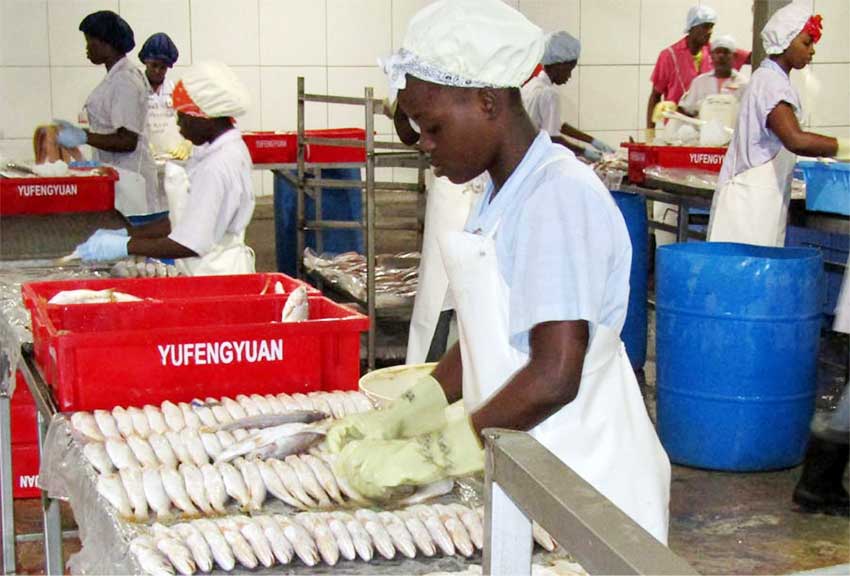PRESS RELEASE – (BELIZE CITY)– The Caribbean Regional Fisheries Mechanism (CRFM) yesterday hosted the 11th Meeting of its Ministerial Council — the highest ranking decision-making body of the regional fisheries organization — at the Pegasus Hotel in Georgetown, Guyana.
Ministers who hold the portfolio for fisheries from the 17 Member States of the CRFM, or their appointed delegates, were slated to attend the event at which Guyana was expected to be elected as the new Chair of the Council.
Fisheries Ministers from across the Caribbean were to review ongoing programmes and the status of and trends in the fisheries and aquaculture sector and also discuss further actions needed to tackle the pressing challenges facing the sector.

“The 11th Meeting of the Council is taking place against the backdrop of the High Level UN Oceans Forum that will take place in New York from June 5-9, 2017 to review progress on achieving Sustainable Development Goal 14: ‘Conserve and sustainably use the oceans, seas and marine resources for sustainable development’,” noted CRFM Executive Director, Milton Haughton.
Haughton said that, “The living marine resources provide employment, income, food and livelihoods, and they are an important component of the tourism product in the region. For these reasons, CRFM Member States have accorded high priority to ensuring proper management and sustainable use of these resources to provide tangible sustainable benefits to the people of the region.”
The Council also aims to improve the trade and economic performance of the sector while addressing climate change and associated threats.
The Ministerial Council will receive and consider the report and recommendations of the 15th Meeting of the Caribbean Fisheries Forum, the CRFM’s technical advisory body, which was held in Jamaica in March in preparation for this meeting of the Council.
With the 2017 hurricane season approaching in just a few weeks, the ministers will discuss the Caribbean Risk Insurance Facility for Fishers. The Caribbean Fisheries Forum has endorsed and now recommends for approval by the Ministerial Council the approach of linking the insurance policy with the Caribbean Community Common Fisheries Policy and the development of Disaster Risk Management Plans for the fisheries sector. They hope that this will incentivize the adoption of best practices for resource management and disaster planning.
Countries would pay lower premiums and receive higher payouts after a disaster event if they have disaster risk management plans for the fisheries sector, have established mechanisms to facilitate cooperation among fishers and are implementing the Common Fisheries Policy.
At the 6th Special Meeting of the Ministerial Council held in October 2016 in Cayman, Fisheries Ministers welcomed the progress on the developments of the insurance facilities for the fisheries sector and urged the Caribbean Catastrophe Risk Insurance Facility Segregated Portfolio Company (CCRIF-SPC) to expedite the preparation of the policies and other necessary arrangements and to launch the policies without delay. Urgent action is needed since threats from climate change and natural disasters, such as hurricanes, pose an ever-present threat to fishers and fish farmers, as well as to food security in the region.
The ministers will continue to review ways in which the countries can continue to collaborate on developing and implementing comprehensive legislation, protocols and guidelines to ensure fish and seafood safety and security, to expand regional trade and the Caribbean’s access to export markets, as well as to provide the necessary resources and investment to ensure adoption within the context of national governance frameworks.
The ministers will be asked to approve proposed follow-up interventions to strengthen the linkages between fisheries and tourism and to maximize potential benefits for local fishers and fishing communities, as well as to reduce the growing dependence on imported fish and fisheries products.
CRFM Member States are being urged to address the constraints to sourcing locally-produced fish and seafood for the tourism sector, such as inadequate quality assurance, unreliability of supply, inadequate volume, product form and transportation, and lack of communication and information flow between fishers and tourist establishments.
They are also being asked to document the extent to which part-time fishermen are involved in the tourism sector (as tour guides, snorkelers, etc.) and to consider, in the context of promoting alternative or associated livelihoods for fishers focused on the tourism sector, the possibility of fishermen being given first preference to livelihood opportunities in marine protected areas (MPAs).
The ministers will also consider the preliminary findings and recommendations of a recently- concluded study to review the impact of cost factors such as capital, labour, maintenance and energy costs on fisheries operations in order to identify policy options and strategies to improve efficiency, profitability, sustainability and economic resilience of the sector.





![Simón Bolívar - Liberator of the Americas [Photo credit: Venezuelan Embassy]](https://thevoiceslu.com/wp-content/uploads/2025/12/Simon-Bolivar-feat-2-380x250.jpg)



